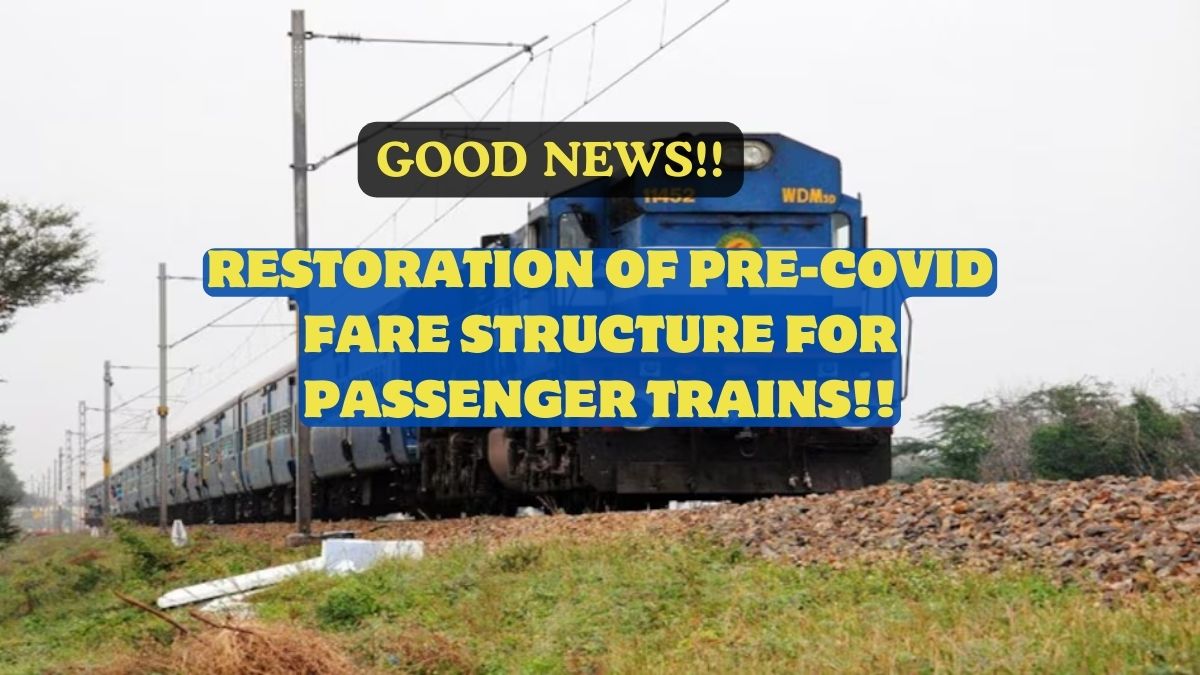Table of Contents
Fare Structure and Renaming of Passenger Trains
Restoration of Pre-COVID Fare Structure For Passenger Trains: The decision by Indian Railways to eliminate ‘Ordinary Class’ fares and increase minimum ticket costs by threefold drew sharp criticism from various quarters. This move, which aligned minimum fares with those of Express Trains, particularly affected economically disadvantaged passengers. Small vendors, daily wage workers, and others who heavily relied on affordable transportation options found themselves burdened by the sudden fare hike.
Reports and public outcry highlighted the significant impact of the transition from ‘Passenger Trains’ to ‘Express Specials’ or ‘MEMU/DEMU Express’ Trains. Despite the name changes, there were no discernible improvements in service quality or train speed. Passengers, especially those from lower-income backgrounds, found themselves paying higher prices without any corresponding enhancements in their travel experience.
You can also read: Watch Mumbai Ahmedabad Bullet Train Project Video Shared By NHSRCL: Bridging Maharashtra And Gujarat!
In response to mounting criticism, the Railway Board convened a meeting on February 26. The outcome of this meeting was the reversal of the fare changes. Effective February 27, Second Class Ordinary Fares were restored on ‘Passenger Trains’, offering relief to commuters who had been adversely affected by the fare hikes.
Public Outcry and Financial Implications
The fare adjustments initiated by Indian Railways sparked widespread debates regarding the organization’s role as a public service provider. Critics questioned whether the Railway’s decisions aligned with its mandate to provide affordable transportation options, especially for second-class travelers. Former railway officer Mathew John raised concerns about discrepancies in performance metrics and financial reporting practices within the Railway.
While the fare changes were aimed at improving Indian Railways’ financial performance, they disproportionately impacted economically disadvantaged commuters. Many questioned whether the move contradicted the Railway’s historical commitment to serving common people.
Passenger Trains Fare Revised: Challenges and Confusion
Restoration of Pre-COVID Fare Structure For Passenger Trains: Passengers expressed frustration over the lack of clarity regarding fare adjustments, leading to chaos at booking kiosks. Some divisions initially failed to update fare structures, causing confusion among passengers. The sudden hike in ticket prices, coupled with the absence of corresponding improvements in service quality, fueled discontent among travelers.
You can also read: Kavach System In Vande Bharat Express: The ‘Kavach’ Trial Unveiled!
Restoration of Pre-COVID Fare Structure For Passenger Trains
Following public outcry and complaints, the South Western Railway took steps to restore the pre-COVID fare structure in its zone. An order issued on February 22 instructed authorities to revert to second-class ordinary passenger fares for MEMU/DEMU and passenger trains, aligning with pre-pandemic pricing models.
Financial Gains and Previous Cases
Despite the controversies surrounding fare changes, Indian Railways reported significant financial gains. The Southern Railway recorded its highest-ever revenue in the passenger segment, signaling positive financial outcomes for the organization. However, previous instances of converting passenger trains into express ones with premium fares raised concerns about accessibility and affordability for commuters.
You can also read: CHECK FULL LIST OF BHARAT RATNA AWARDEES FROM 1954 TO 2024!
Conclusion
The controversy surrounding fare changes and train renaming reflects broader debates about public transportation and accessibility in India. While Indian Railways seeks to improve its financial performance, it must balance financial sustainability with its commitment to serving all segments of society. The restoration of pre-COVID fare structures signifies a recognition of the importance of affordability in ensuring equitable access to transportation services. As Indian Railways moves forward, it must prioritize the needs of its diverse passenger base while striving for operational efficiency and financial viability.


2 thoughts on “Restoration of Pre-COVID Fare Structure For Passenger Trains: From Price Hikes to Pre-COVID Rates Overnight From 27 Feb!”